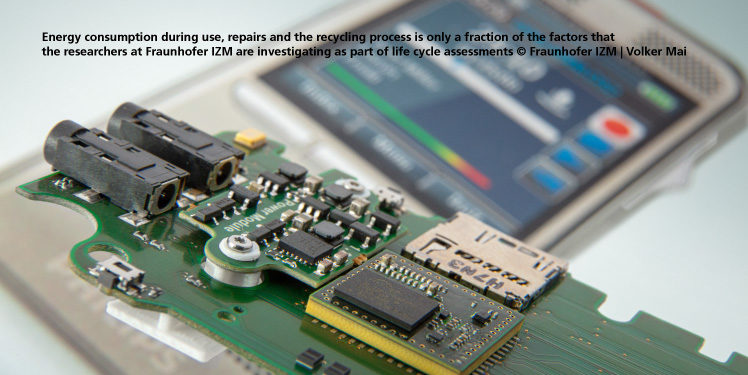Although life cycle assessments do not save the environment, it can make industry think, as the example of life cycle assessments for electronics shows. Every electronic product, useful as it may be, comes with a heavy ecological backpack: From the extraction of raw materials used and design decisions to the use and disposal of an electronic product, every step in the manufacturing process leaves its mark on the environment. Researchers at Fraunhofer IZM analyse the entire life cycle of electronic products and product groups on the basis of standardised benchmarks and ISO norms and develop optimisation proposals.
Ever more manufacturers and users are interested in the environmental impact that products have. The focus is not only on what a product can do but also on the conditions under which it was manufactured. This movement is also supported by politics: For example, the “2nd Circular Economy Action Plan” of the European Commission outlines how environmental management and product design must be oriented in the future in order to be as resource-saving and climate-neutral as possible.
The awareness of sustainable product development is growing, especially in the electronics industry: Leading companies like Apple publish key figures for their products in so-called Environmental Responsibility Reports. These comprehensive reports evaluate the complete product life cycle under ecological aspects.
Life cycle assessments comprise complex factors and, if possible, all conceivable scenarios. The energy consumption of the appliance is what counts in the evaluation, as well as repairs and maintenance. When an end product has reached the end of its useful life, recycling processes or disposal can also trigger further environmental impacts to be included in the overall life cycle assessment. “It is essential to have an understanding not only of the analysis but also of the technologies at stake. Only then can solution-oriented design improvements, suitable indicators and requirements for the supply chain be derived,” emphasises Karsten Schischke, expert for environmental assessment and ecodesign at the Fraunhofer Institute for Reliability and Microintegration IZM. Schischke and his team have taken on the challenge posed by the fact that hardly any data on the service life and utility of new products is known.
Fraunhofer IZM is qualified to perform such analyses for companies as an independent third-party due to its many years of expertise in the field of microelectronics. Based on the relevant ISO standards for life cycle assessment and environmental management*, researchers at Fraunhofer IZM evaluate and verify the life cycle assessments of third-parties and contribute, above all, to the ecological optimisation of products and processes. They indicate which substances need to be substituted or which processes need to be changed.
However, preparing a life cycle assessment is not a five-minute process. By way of example: As part of an assignment, Fraunhofer IZM experts were tasked with drawing up a life cycle assessment for the sustainably developed smartphone called Fairphone. The trick behind this smartphone: Several components are modular, meaning that they can be easily replaced in case of failure. Users are thus encouraged to have the Fairphone repaired instead of buying a new one. The multi-layered study by Fraunhofer IZM showed that despite a sustainable product design, the Fairphone initially causes greater environmental impact during production because more individual components are initially produced for the modular composition. If this modularity, in turn, contributes to a longer service life for the overall product, the impact then becomes positive.
Schischke summarises his work with these words: “The better product is the goal, not necessarily the perfect assessment,” and adds: “LCAs are dynamic: reparability, modularity and product design – all factors should be considered from day one to create a more sustainable product”.
But improving the environmental impact is only just the beginning of its achievements: The European Commission also uses simplified life cycle assessments to evaluate entire product groups under the Ecodesign Directive. Against this background, Fraunhofer IZM has already developed the underlying methodology of life cycle assessments further in 2014 and, on behalf of the European Commission, is currently investigating the product group of mobile phones for possible regulatory requirements – with a special focus on material efficiency.
Furthermore, the calculation of greenhouse gas emissions at European level can still have far-reaching effects if aCO2 tax is introduced as announced: For this purpose, greenhouse gas emissions that arise during production, i.e. in the upstream chains of imported goods, are to be priced.
Schischke and his team see great potential in environmental assessment despite the challenges: “Climate neutrality is already a real goal for many companies. However, many companies only focus on the effects of their own production and energy consumption. It is at least as important to look at the supply chain in order to procure only climate-neutral components in the medium- and long-term.”
*ISO 14040, 14044, 14064-3 compliant https://www.iso.org/iso-14001-environmental-management.html
You want to know more about the hole life chain of electronic products? Register now for our Online Workshop “Reliability of Electronic Systems” from November 26-27. The tutorial is organized by the Institute’s Department of Environmental and Reliability Engineering, which supports new technologies on their path towards full commercial maturity. The course introduces the methods and backgrounds of application-specific reliability assurance processes in the development and production of electronic systems. More information: https://www.izm.fraunhofer.de/en/news_events/trainings-and-workshops/ws_12.html
This interview was conducted by Olga Putsykina from Fraunhofer IZM Marketing & Business Development department.
IT CAN BE ALSO INTERESTING FOR YOU:
- Modular Electronics – A Sustainable Solution For The Smartphone Era?
- Smart Farming: Facilitating Change For Pharmacy, Medicine, And Nature
- How Waterproof Flexible LED Systems Became a Reality

